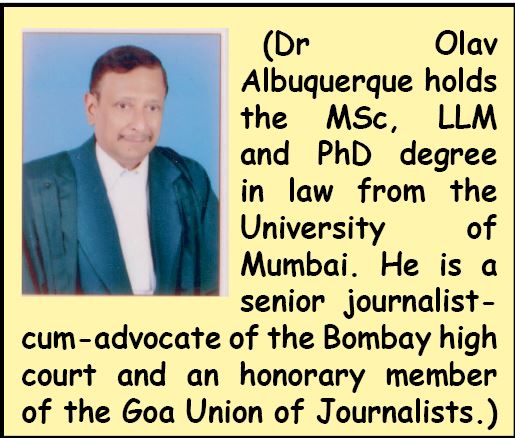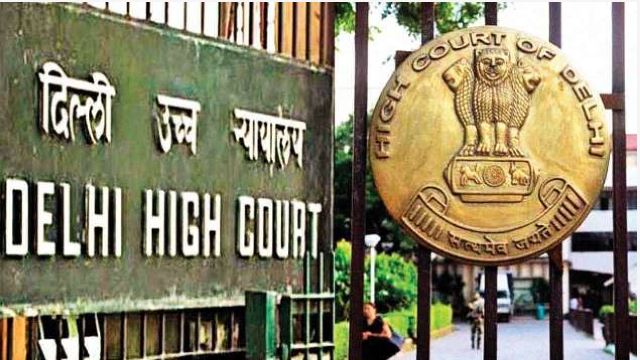By Dr Olav Albuquerque
JUDGE-MADE laws keeps changing with changing circumstances, setting up new hurdles for the probe agencies to do their work. This was not the case when the Portuguese ruled Goa. This was simply because the Portuguese judges followed an inquisitorial system, unlike the British who followed the common law system. The latest hurdle was set up when a Delhi court ruled that an accused cannot be forced to divulge his password or user ID of his computer or mobile to investigators.
Added to the newly-imported theory of “residual doubt” in Indian criminal jurisprudence in 2014, which lies between proving beyond reasonable doubt and absolute certainty, this theory is a mitigating circumstance while pronouncing the death sentence on rapists and murderers.
Thankfully, this axiom that an accused cannot be forced to divulge his password does not become law, unless it is upheld by the Delhi high court and later by the Supreme Court. At most, it has persuasive effect. The judge, Naresh Kumar Naka, said if an accused is forced to divulge his password, it is a violation of Article 20 (3) of the Constitution which prevents a person from becoming a witness against himself.
Laka referred to the Supreme Court’s verdict which did not allow the use of narco-analysis or the lie detection test which forces the accused to divulge personal and private details, thereby attracting Article 20 (3) which upholds the right of the accused to remain silent. Forcing him to reveal his passwords would entail divulging incriminating evidence against himself.
SEEK TECHNICAL EXPERTS
HOWEVER, Judge Laka said the probe agencies like the CBI or the Enforcement Directorate were free to seek technical experts who could crack the password-protected computer or mobile phone. Sachin Waze who allegedly planned the murder of Mansukh Hiren, threw his laptops into the river to destroy all evidence. It is no doubt true that investigative agencies must seek corroborative evidence which is independent of what the accused tells them. But judges follow a different method while convicting or acquitting those accused of heinous offences. A judge starts from the testimony of the last witness and checks if the witness and the testimony he has given fall within the definition of the offence the accused has been charged with. If not, the testimony is worthless.
So, when amendments are made in the criminal procedure to protect criminals, we must assess whether blindly following the British system of proving beyond reasonable doubt is acceptable? Laws like the Prevention of Money Laundering Act and the Unlawful Activities Prevention Act, apart from the Armed Forces Special Powers Act, overturn the basic guarantees of not deposing against yourself in Article 20 (3). This was why a Catholic priest, Fr Stanislaus Lourduswamy, was charged with having Naxalite links and died in custody even as his application for a sipper was not granted immediately.
RAPE & MURDER
THE point here is that no thought is given to the victims of heinous crimes such as rape and murder, but the Enforcement Directorate can use statements made to them in money-laundering against accused persons. In rape-and-murder, the lives of families are destroyed while in money-laundering cases such as those slapped against former home minister, Anil Deshmukh, the coffers of the state are depleted. Rape or murder are as heinous as money-laundering. There cannot be a pick-and-choose category.
The silver lining to this gloomy scenario is the Supreme Court has ordered the Union and all State governments, to erase the humiliating two-finger test from the MBBS curriculum, because it is conducted on rape victims to ascertain her prior sexual history.
Quite rightly, Justices DY Chandrachud and Hima Kohli said the obsolete “two-finger test is based on the incorrect assumption that a sexually-active woman cannot be raped. Nothing could be further from the truth. A woman’s sexual history is wholly immaterial while deciding if she had consented to sexual intercourse.”
The judges passed these remarks while restoring the conviction of a man for the rape and murder of a minor girl in Jharkhand in 2004, who shockingly, had been subjected to this two-finger test by a medical board in that state.
PUNJAB & HARYANA
WITH the 100-year-old Punjab and Haryana high court now having 13 women judges, patriarchal attitudes such as asking if the rapist will marry his victim, which was asked by former CJI Sharad Bobde in open court, does not alleviate the trauma of the victim. The disgusting attitude that boys will be boys which is why a woman had it coming, because she was not demure enough, infects the mindset of our law-makers like the late Mulayam Singh Yadav. He promised to abolish the death penalty for rapists in 2014 if returned to power because “boys will be boys.”
The Justice JS Verma committee set up in 2012 after the Nirbhaya gangrape in Delhi recommended its banning. The Criminal Law (Amendment) Act, 2013 mandates a rape victim’s character or her sexual history is irrelevant to assess whether she consented to sexual intercourse. Yet, the failure of the states to prevent the use of the two-finger test in the curriculum of the MBBS course, proves that ignorance and patriarchy permeates the higher echelons of science as it does some sections of the judiciary.
The two-finger test is also called the “virginity test” and has had a long history of misuse throughout Asia, where patriarchy enshrined in religion guides judges and doctors, so rape victims cannot be heard in these erudite institutions. Women’s emancipation remains chimerical when such patriarchy drowns a woman’s cry for succour.

